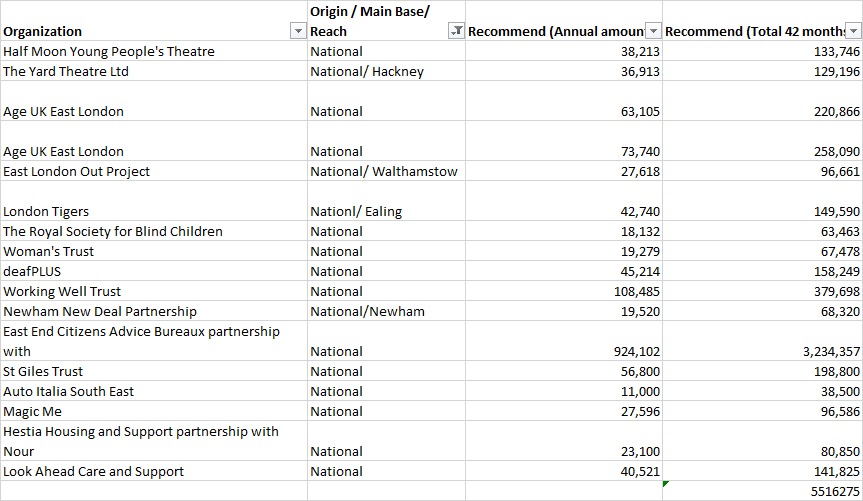BY Email: [email protected]
Cllr James King
Chair of the Overview and Scrutiny Committee
London Borough of Tower Hamlets
Town Hall, Mulberry Place
5 Clove Crescent
London
E14 2BG
Date: 27/07/2019
Dear James,
RE: Concerns with regard to the Local Community Fund (LCF) process and awards.
I am writing to you, as Chair of the Overview and Scrutiny Committee, with regard to the Local Community Fund (LCF), which is due to be discussed by the Overview and Scrutiny Committee on Monday 29th July 2019 and then considered by Cabinet on the 31st July 2019. In the last few days I have been contacted by various local organisations, moving away from the award of individual applications, the feedback from local voluntary organisations has raised structural concerns with regard to the process and the proposed outcome of the LCF ward.
1. Overall Picture: Council spend in the age of austerity
When looking at the overall strategic picture, discussion around the LCF should be looked in the context of wider austerity programme by Government. That Tower Hamlets council is facing the prospect of having no Revenue Support Grant from Central government, with all revenues expected to be raised through local taxation. Bringing into sharp focus not only on the amount the Councils spends but on how they do it, looking at the multiplier effect of council spend and how the Council through policy, can make sure it’s spend has a maximum beneficial impact on the local economy.
Community wealth building is a new approach to economic and place development built on the effective harnessing of public and private wealth. It seeks to do this through increasing democratic ownership of the economy, whereby we can more readily guarantee decent jobs, equity, inclusion, economic stability, social development and environmental stability.
This new approach to development has lead to pioneering work by organisations such as APSE, CLES in the UK, and the Democracy Collaborative in the United States, resulting in successful community wealth building initiatives in the City of Cleveland in the United States and Preston in the United Kingdom. Therefore I am asking the Overview and Scrutiny Committee to look at not just the outcomes of the LCF of awards but also the means of how these outcomes are delivered.
2. Gender, BAME and localism audits
First concern is the East End Community Foundation, the awarding body in terms of the grants. Has the council carried out a gender, and in the context of highest level of structural poverty in the Borough, BAME and localism audit (how many of the staff and trustees live in Tower Hamlets)?
Second, has there been a gender, BAME and localism audit carried out of all the applicants? From a cursory look at the awards it appears this has not happened.

3.There appears to be a mismatch with Council Strategy and and a lack of understanding of how the Third Sector Operates by the Council
There appears to be a mismatch between the Council’s own strategy and the awards given through the LCF. A good example is the fact that no awards were given to organisations that facilitate organised play, despite organised play and the age group of 5 – 15 being a priority set by the Council in various strategies.
More generally, there seems to be a lack of understanding how the third sector operates in the local economy. This is evidenced by the low level of historic and current level of awards to third sector organisations in the borough, as well as the number of local third sector organisations in the borough that are in financial distress. This has not been helped by the current approach to community assets, which is more focussing on ‘sweating’ those assets rather than look at the impact and outcome. A good place to look at good practice is the approach by Kensignton and Chelsea Council towards its voluntary sector.
4. Rolling Review and further audits
Ideally the best approach to the current concerns raised with regards to the LCF is to put a halt to the current awards, until further audits are carried out with regards to the awarding body, the East End Community Foundation, as well as the applicant, the awards reviewed and revised in light of the audits (BAME, gender and localism).
However, given the current political realities, it would be expedient to put a one year break clause, subject to further audits, in the awards. Second there should be a moratorium of contracts awarded by the Council to the East End Community Foundation. This will allow the Council with elected members to carry out the above audits with regards to East End Community Foundation and applicants, and if necessary terminate contracts. The above will be in addition to the current rolling calendar review of upcoming grant award end-dates, review dates, or break clause dates.
If you do have any further queries please contact me.
With Regards,
Cllr Puru Miah
Mile End


Recent Comments